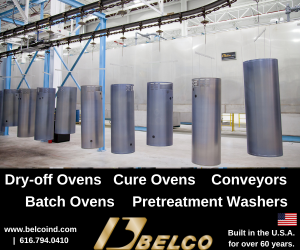Cleaning Plastics
Question: We are a third tier automotive supplier for plastic parts like grills, hubcaps and other trim parts.
Question:
We are a third tier automotive supplier for plastic parts like grills, hubcaps and other trim parts. The parts are molded out of ABSand/or ABS/PC plastic. Ninety percent of what we do is paint, the rest is a chrome plate process. Since we don’t mold or chrome the parts in house, we are wondering if there is a way to wash the parts prior to our painting process. For more than 11 years we have just used DI air and blown the parts off one at a time just prior to painting it. Now it seems our customers want to know why we don’t wash the parts. Does anyone else wash plastic parts for this type of application? My experience in plastic is in a case where it would need washing, that hand wiping it with denatured alcohol has worked but that is not really feasible for large runs of parts. R.H.
Answer:
Part of the need to provide a pretreatment would be due to the type of paint you are using and the performance requirements it is expected to meet. A more “forgiving” paint like a solvent-based system, would require less pretreatment than water-based or powder.
Also, I am not sure how close you are to meeting the performance requirements of your coating. If you are meeting the specifications of your customers, I am not sure why they are asking you to add additional steps to your manufacturing process that they will wind up paying for in the end. If you are falling short of the customer expectations, that would likely justify the investment into additional pretreatment equipment. You mentioned that currently, in some situations, you do experience the need to “pretreat” your parts by hand wiping with alcohol, which indicates that you must have some means to differentiate a clean from a dirty part, and the effect that has on your overall paint process.
The deionized air you are currently blowing your parts off with will do no more than remove particulate contamination from the surfaces. To actually remove surface contamination from processing (for instance, mold release agents), it is more common to use an acidic cleaning solution that also contains surfactants. The acid along with the surfactant is usually sufficient to remove many processing agents from the surface of the plastics. The acid is usually phosphoric acid and most often, this step is performed using a spray washer. Following the cleaning step will be a rinse. Usually a tap water rinse is sufficient if you have at least moderately good water quality. The final step in the pretreatment is usually a rinse that incorporates a rinse aid. The purpose of the rinse aid is to eliminate water beading and spotting by allowing the water to shed uniformly off the otherwise hydrophobic surface. The rinse aid may be reactive such that it actually turns the surface of the plastic from hydrophobic to hydrophilic. All of these steps could be automated with a spray wash system. If a larger-scale capital investment is not feasible, it may be possible to find the right chemistry in a spray-wand type of system that could allow separate steps to the process. I would suggest looking into the Products Finishing website for a list of potential suppliers. Select Cleaning and Pretreatment Chemicals then Cleaning Chemicals, aqueous for a listing.
Related Content
Robots, AI and Superb BMW Surfaces
There isn’t an automotive paint shop in the world that doesn’t have post-paint inspection and defect processing. But BMW is doing this with levels of technology at a plant in Germany that exceed all other paint shops in the world.
Read MoreCoatings Plant Evolves with Market Trends
Expanding its focus from exclusively serving the RV industry, one of this company’s stand-alone coatings plant has successfully extended its services to additional markets.
Read MoreEpoxy Rebar Company Reinforcing Roads of the Future
Providing epoxy-coated rebar with the ultimate corrosion resistance is Simcote’s focus for the infrastructure industry it serves.
Read MoreHenry Ford Is Still Right When It Comes to Color
Who would have imagined that more than 100 years after his famous statement about any color as long as it’s black would still have relevance of a sort?
Read MoreRead Next
Education Bringing Cleaning to Machining
Debuting new speakers and cleaning technology content during this half-day workshop co-located with IMTS 2024.
Read MoreEpisode 45: An Interview with Chandler Mancuso, MacDermid Envio Solutions
Chandler Mancuso, technical director with MacDermid Envio discusses updating your wastewater treatment system and implementing materials recycling solutions to increase efficiencies, control costs and reduce environmental impact.
Read MoreA ‘Clean’ Agenda Offers Unique Presentations in Chicago
The 2024 Parts Cleaning Conference, co-located with the International Manufacturing Technology Show, includes presentations by several speakers who are new to the conference and topics that have not been covered in past editions of this event.
Read More























